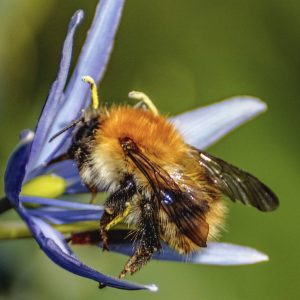Nature-lovers are being urged by environmentalists, bee scientists and wildlife gardening experts to help the nation’s under-threat bees by creating pollinator-friendly gardens, schools and neighbourhoods, ahead of this year’s Great British Bee Count (19 May-30 June 2017).
Now in its fourth year, the Great British Bee Count inspires members of the public to download a fun, free app to identify and find out more about how we can help some of the amazing bees that we share our towns and countryside with.
Over fifteen thousand people took part in last year’s Great British Bee Count, organised by Friends of the Earth, with support from Buglife and sponsorship from Waitrose.
This year’s app is even better, with more bees and plant species, clearer identification and more information on how to help bees. The bee sightings will be mapped on www.greatbritishbeecount.co.uk and shared on the National Biodiversity Network, where researchers, experts and local authorities can access the data.
Habitat loss is one of the biggest threats Britain’s bees face, which is why it’s more important than ever that we understand more about Britain’s 260+ bee species, and why bee scientists and wildlife gardening experts are urging people to play their part by creating bee-friendly habitats.
Friends of the Earth chief executive Craig Bennett said:
“Bees are crucial pollinators for our fields, gardens and countryside. We can all help these under-threat pollinators with a few simple tips for creating bee-friendly gardens, schools and other open spaces. By taking part in this year’s Great British Bee Count with our fun, free app, you can you can find out more about these fascinating and valuable insects.”
Kate Bradbury, wildlife gardening expert and author of The Wildlife Gardener adds:
“Getting to know bees is one of the most rewarding experiences. From the big buzzy bumbles to red mason and leafcutter bees, to tiny things that you’d never see if you didn’t stop to look, there’s a whole world out there waiting to be discovered. And, by taking a few simple measure, you can help these vital pollinators too.”
Bee expert Professor Dave Goulson from the University of Sussex says
“Our wonderful wild British bees are under threat. But the good news is that everyone can help. Plant some bee-friendly flowers or herbs in your garden, in a pot on your balcony or in a window box, or persuade your school to create a bee friendly space – then sit back and enjoy the sight and sound of lovely buzzing bees. Cutting out pesticide sprays will help the bees, and the birds and butterflies too.”
Bee expert Professor Simon Potts from the University of Reading adds:
“Everyone can help our under-threat bees this Spring. Research has already show that our towns and cities can be great places for bees – if the right plants are grown in parks and green spaces. With a bit of bee-friendly gardening, and a bit more tolerance of weeds, we can all help to make sure our streets and neighbourhoods are buzzing with these amazing insects.”
Some simple tips for creating bee-friendly spaces:
* Grow bee-friendly plants
Bees visit plants for their nectar and pollen, and may visit a plant for one or both of these. As a general guide, bees see purple and blue better than other colours. They’ll use their senses to find other colours such as white apple blossom. Different bee species prefer different flower shapes, so aim for a range from tubular-shaped flowers like snapdragons and wallflowers, to open-headed flowers like yarrow and verbena. It’s not just flowers like these that bees love – try shrubs, herbs, trees (hazel, pussy willow) and fruit and veg (beans, peas, peppers, onions) too. Spring and autumn flowering bulbs are also great.
* Plant through the seasons
Bees need food through every season, not just the summer. Get started with Friends of the Earth’s free seasonal guide to 28 great plants for bees.
* Short of space?
Even if you don’t have a garden or much space, a few plants in a window box or pots will all help bees. Try lavender, heathers, nasturtiums, sunflowers and bulbs like crocuses. Herbs are great too for containers.
* Enjoy fresh herbs
Herbs provide a valuable source of food for bees – and great flavours for your cooking. Chives, sage, marjoram, mint and thyme are great if you have limited space. Discover 5 easy herbs which bees will love: https://www.foe.co.uk/living/articles/easy_summer_herbs_40194
* Learn to love a few weeds
If you have a lawn, leave some dandelions and clover to flower for the bees. A ‘messy corner’ with a pile of old wood and leaves will help bees and bring other wildlife too
* Avoid using pesticides
Help wildlife thrive by putting away the chemical pesticides, especially those containing bee-harming neonicotinoid pesticides.
* Buying a gift?
Bee-friendly plants or a bee hotel make a lovely gift. How about a patio fruit tree like a crab apple or cherry (wild, sour, bird or plum cherries) for a special anniversary? Strawberries and blueberries are great for young children.
SOME BEE FACTS
• A 2014 YouGov poll revealed that 85% of people agreed that ‘bees dying off’ was a ‘very’ or ‘fairly’ serious issue: https://yougov.co.uk/news/2014/06/27/bees-dying-most-serious-environmental-issue/
• What did you have for breakfast today? Jam on toast? Fresh fruit? Dried fruit in your muesli or some grilled tomatoes with your fry-up? Maybe fruit juice or a coffee? All of these were pollinated by bees. It’s tempting to think bees just provide us with honey – but in fact they’re responsible for much of the food we eat, including most fruit and vegetables.
• Bees are crucial to our economy – without them it would cost UK farmers at least £1.8 billion a year to pollinate our crops. In a world without bees, our food would cost a lot more to produce and our economy would take a big hit. Our diets would also be far less interesting and lack many vital nutrients.
• The honey bee is probably the best-known bee around, but there are actually over 260 species of wild bumblebee and solitary bee in the UK. These do not produce honey, but they are important for pollinating our gardens, parks and crops.
• Since 1900, the UK has lost 20 species of bee, and a further 35 are considered under threat of extinction. None are protected by law. Across Europe nearly one in ten wild bee species face extinction.
• Bees are facing numerous threats. Known causes of bees’ decline include things that affect us too – changes in land use, habitat loss, building projects, disease, pesticides, farming practices, pollution, invasive non-native plant and animal species, and climate change
• From pub signs and town names, from Shakespeare to JK Rowling, from beehive hair-dos to phrases like “having a bee in your bonnet” – the bee has been a star for centuries. Pliny called honey the “saliva of the gods”, while Chaucer was one of the first to use the phrase “busy as bees”. The bumblebee has always been a source of special delight because of its portly features and furry body and bottom. Mr Bumble in Oliver Twist and Dumbledore (a Cornish word for bumblebee) in Harry Potter suit their names well.
More information:
1. People can register to take part in this year’s Great British Bee Count at www.greatbritishbeecount.co.uk
2. The Great British Bee Count aims to raise awareness about Britain’s under threat bees – including the variety of species (we have over 260 in Britain alone). It also encourages people to help bees. For example by creating bee-friendly habitats. The data recorded will be uploaded to the National Biodiversity Network so that they can be accessed by researchers.
3. Over 380,000 bees were recorded last year. The results can be found here: https://www.foe.co.uk/page/great-british-bee-count-results
4. Kate Bradbury: https://www.theguardian.com/profile/kate-bradbury
5. Professor Dave Goulson, University of Sussex, studies the ecology, behaviour and conservation of bumblebees: http://www.sussex.ac.uk/lifesci/goulsonlab/
6. Professor Simon Potts, University of Reading, who co-authored a 2015 study showing urban habitats provide haven for UK bees: https://www.reading.ac.uk/news-and-events/releases/PR622410.aspx
7. Friends of the Earth’s Bee Cause Campaign is supported by the players of the People’s Postcode Lottery’.
8. About Friends of the Earth: For more than 40 years we’ve seen that the wellbeing of people and planet go hand in hand – and it’s been the inspiration for our campaigns. Together with thousands of people like you we’ve secured safer food and water, defended wildlife and natural habitats, championed the move to clean energy and acted to keep our climate stable. Be a Friend of the Earth – see things differently. For further information visit www.foe.co.uk, follow us at @wwwfoecouk, or like our Facebook page.










